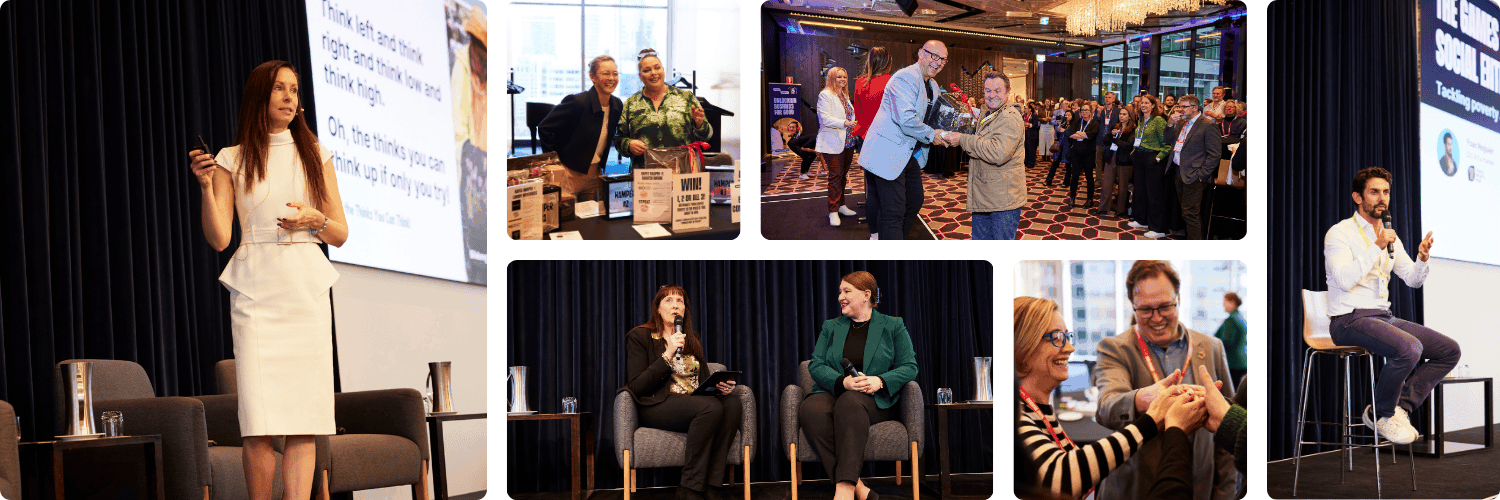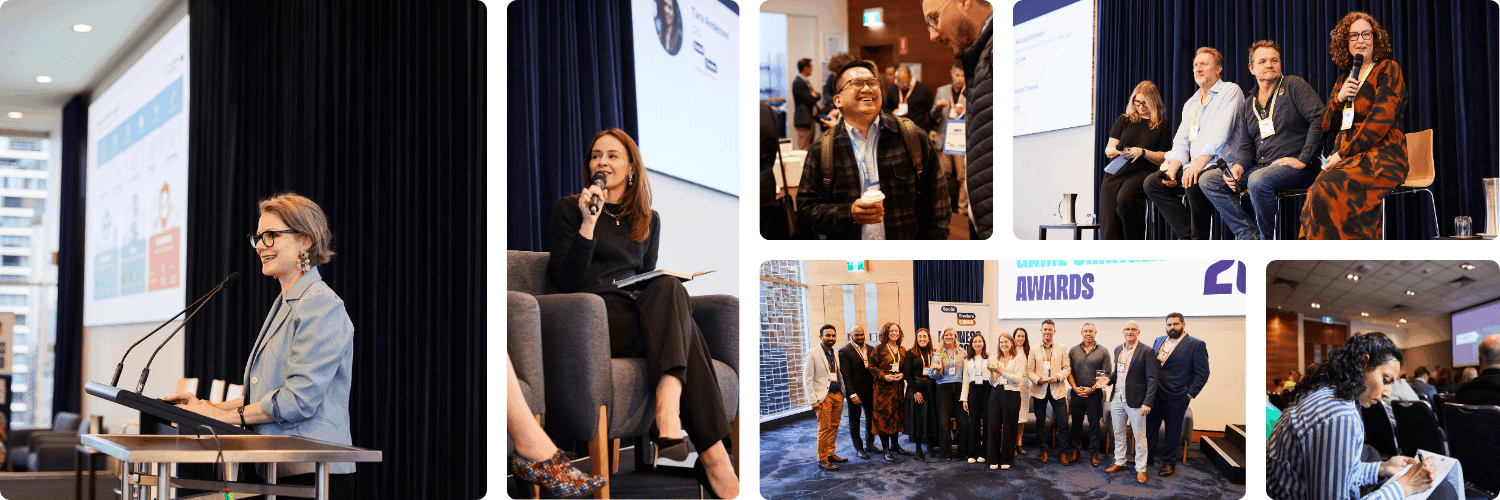Melbourne hosted the sold-out Social Traders Convene 2025 at RACV City Club, bringing together 350 participants from across the social enterprise sector. Supported by the Victorian State Government, Westpac Group, RACV and over 20 other partners, the event united social entrepreneurs, business leaders, government, and philanthropists—all committed to making business a force for a fairer, more equitable society.
Speaking at Convene, Tara Anderson CEO Social Traders said, “To make change, we need to work with one foot inside the current system, and one foot outside it. And that’s about creating kinks in the system. Social enterprise itself is a kink in the system. It uses the current market to generate social and environmental outcomes, and it proves that doing good and doing business are not mutually exclusive.”
Despite a challenging economy, Tara shared that the social enterprise sector is growing. With Social Traders dataset of 6,200 identified social enterprises including 780 that are certified – latest analysis reveal social enterprises are sustainable businesses and generate impact.
Over the last five years, 10% of social enterprises have experienced growth in trade revenue and a 3.7% close down rate compared to 8.1% of employing businesses.
When looking at impact, 23% of certified social enterprises’ revenue is spent on impact costs and 47% of certified social enterprises create jobs for people shut out of work.
This is part of the proof that social enterprise is a powerful way to use the market to drive impact. A full report will be released in November with more in-depth insights into the social enterprise sector.
Social performance progress
There is growing momentum in the business community with social performance being harnessed as a strategic business advantage. In the last seven years, $1.1 billion was spent with certified social enterprises. Social Traders is seeing:
- 11% growth in businesses joining;
- 8% year on year increase in spend;
- 64% increased the number of certified social enterprises they buy from; and
- 62% increased overall spend.
The motivations for engaging in social performance has changed, now primarily aligned to ESG goals and company values – increasing by 20% since 2020 compared to tender requirements. More industries are also coming onboard outside of construction and property including banking, education, energy, finance and FMCG.
There is a shift in businesses making the commitment to deliver and report on social performance more than ever before. And the frontrunners are already working to get ahead of regulatory requirements by building it into their business strategy.

Leading with purpose
Mirvac, one of Australia’s leading diversified property groups, is setting the standard in sustainability with its “This Changes Everything” strategy, reflecting over a decade of commitment. The company achieved net zero Scope 1 & 2 emissions in 2021—nine years ahead of schedule—and is now focused on decarbonising its full value chain.
Employee engagement is also strong, with 93% believing Mirvac is “a force for good,” over half participating in community volunteering, and Mirvac has maintained a zero gender pay gap for nine consecutive years.
Social procurement is a key driver of impact for Mirvac, with $100 million committed to the social sector by 2030. In partnership with Social Traders, Mirvac is running a Supplier Development Program focusing on building the capacity and capability benefiting both social enterprises and Mirvac’s employees. Mirvac has been a member of Social Traders since 2015.
At Convene Sarah Clarke, GM Sustainability emphasised the importance of staying focused to successfully deliver on purpose. “You can’t do anything if you’re trying to do everything,” she says. Mirvac’s success lies in rallying behind clear, deliberate and purposeful initiatives.
Supporting human rights is smart business
When it comes to human rights, Australia leads from a reporting standpoint yet there is still 41,000 people estimated in modern slavery conditions in the country. Australian Human Rights Commissioner, Lorraine Finlay urges businesses to embed human rights because “It’s the right thing to do, and really quiet a smart thing to do. It helps drive economic growth, drive development and it helps lift economies.”
She also noted that reporting obligations haven’t had an impact on the ground and there is still a critical gap between compliance reporting and actual change for affected individuals. Transformation is needed from a ‘tick box exercise’ to meaningful impact measurement.
While it can be overwhelming to think about creating our business in a way that is perfect when it comes to human rights, Lorraine encourages businesses to make improvements incrementally, instead of the pursuit for perfection. “Make today better than yesterday,” she said.
To tackle modern slavery effectively, Sarah Parker from Freedom Hub says organisations need to look deeper into their supply chains—not just their direct suppliers—to gain better transparency. She also highlights the importance of including survivors’ voices and experiences in developing policies and practices. "If we find we're working with a supplier where there is a modern slavery risk, work with them, walk hand in hand to actually put things in place."

Changing the game, creating lasting legacies
In the lead-up to the 2032 Brisbane Olympic and Paralympic Games, Australia has a unique opportunity to create lasting social impact. Yoan Noguier, CEO and Co-founder of Yunus Sports Hub, shared lessons from managing procurement for the Rio Games with severe budget constraints, which led to innovative local sourcing and influenced global procurement practices.
Building on this, he launched the first Olympic social procurement program in 2018 and over six-years contracting over 600 social enterprises. For Paris 2024, this represented 18% of all tenders with at least one social enterprise involved. The social procurement program’s legacy includes:
- Ongoing use in public procurement and major infrastructure projects
- Replication for the Winter 2026 Olympics, proving scalability and adaptability
- IOC policy change making social procurement a standard for future Games
Yoan stresses that Olympic infrastructure should serve the end-user and long-term community needs, not just short-term Games requirements. Every dollar spent should deliver measurable social outcomes and lasting benefits through a well-designed social procurement framework.
Social Traders is excited to be part of the collective helping to drive social procurement for The Brisbane Games alongside White Box Enterprises, Queensland Social Enterprise Council, SEFA, Supply Nation, WEConnect, Food Connect and the English Family Foundation. The collective has launched GoodSupply 2032 to drive inclusive employment and act as a springboard for social enterprises into major supply chains, building a legacy of long-term capability.
Social impact champions revealed
For the 12th year running, Social Traders celebrated the frontrunners, visionaries and impact champions leading the charge towards a fairer more equitable Australia.
Commenting on the awards, Tara Anderson CEO Social Traders said, “This year we had 130 submissions. The awards showcase the exceptional work as part of the social enterprise sector and inspire others to act in making social procurement business as usual in Australia. Congratulations to all our 2025 Game Changers for their commitment in social impact and using business for good.”
The 2026 winners:
Game Changer of the Year – Business/Government Member
Nicole Donnison (Icon) – recognised for her outstanding commitment to social enterprise and social procurement.
Game Changer of the Year – Certified Social Enterprise
Phil Hayes-Brown (Wallara Australia Limited) – honoured for championing social procurement and advocating for an economy where everyone who wants a job, can get a job.
Social Enterprise Pioneer
WV Technologies – celebrated for exceptional innovation and creativity in tackling social and environmental challenges.
Social Procurement Impact Partnership of the Year
ACCIONA – SPA x Navaroo – awarded for unlocking new opportunities and delivering social impact through collaboration.
Together, let’s find the good in business
A massive thank you to everyone who attended the day and made it possible. The energy in the room was electric. There’s really something special when the business for good community comes together. Despite us sometimes feeling that we’re pushing sand uphill, Tara reminds us to hold on to our joy and don’t forget to have fun along the way,
"the work is truly joyful when it serves the common good.
Convene 2025 Highlights